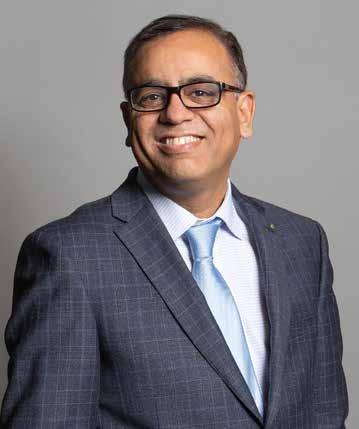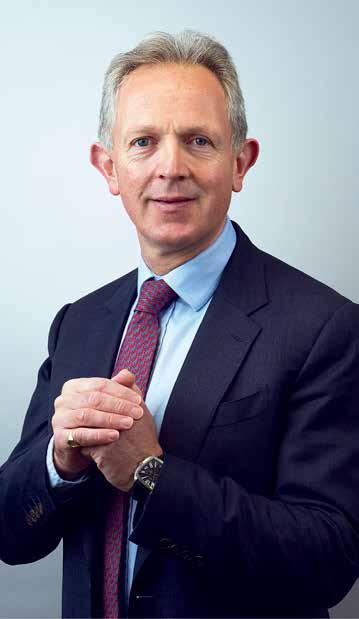
7 minute read
Harwell granted special life sciences status
from HealthInvestor
Policy and politics
Harwell granted special life sciences status
Harwell Science and Innovation Campus in Oxfordshire has been designated as a Life Sciences Opportunity Zone by the Office for Life Sciences.
Introduced in 2016, through the Life Sciences Sector Deal, the government has created a small number of specially designated ‘zones’ in the UK with the purpose of promoting UK life sciences capabilities.
Harwell will be given this title for a 10-year period and is one of only seven locations in the UK to receive such status.
The government will work with Harwell campus to attract national and foreign investment, establish trade agreements and promote the campus as a location for start-ups. Harwell is a 700-acre campus home to 6,000 people across 200 organisations and also home to the HealthTec Cluster which is centred around £2 billion of open access National Physical Laboratories. These include the Diamond Light Source, ISIS Neutron and Muon Source, Central Laser Facility, as well as new the Vaccines Manufacturing and Innovation Centre and Rosalind Franklin Institute.
Research and commercial work on Harwell campus spans everything from drug discovery, including fragment screening, artificial intelligence-enhanced drug design, vaccines, advanced medicines, through to environmental impacts on human health, biomaterials and ageing.
The news comes a week after the government’s launch of the Nucleic Acid Therapies Accelerator (NATA) and the new Extreme Photonics Applications Centre (EPAC), both at Harwell.
NATA leads research in delivering medicines that target untreatable diseases, including Parkinson’s, Huntingdon’s and cancer.
EPAC will be a new advanced imaging centre, housing lasers that produce 3D X-rays in just 40 seconds.
Harwell Campus is expanding via a private public partnership between Harwell Oxford Partners and U+I, plus two government backed agencies, the Science and Technology Facilities Council (UKRISTFC) and the UK Atomic Energy Authority.
Nadhim Zahawi, life sciences minister, said: “The UK is home to one of the strongest, most vibrant health and life science industries globally, with discoveries and improvements in health diagnosis transforming people’s lives. Collaboration is vital to growing this sector.”
Adrian Hill, STFC-UKRI lead for the HealthTec Cluster at Harwell, commented: “The campus continues to evolve in order to meet the nation’s technological and health challenges. The Life Sciences Opportunity Zone designation will be a key driver for future growth in Oxfordshire and along the M4 corridor, creating jobs and contributing to UK GDP.”
Gordon Duncan, a partner at Harwell Science and Innovation Campus, said: “The life sciences industry contributes over £70 billion per annum to the UK economy and provides 240,000 jobs. Harwell Campus plays an increasingly important role at the centre of this sector. We have a unique platform here to help accelerate research and innovation around the country, taking applied research and turning it into commercial outputs using state of the art technologies and applications – this is unparalleled across Europe.”
Royal College of Nursing calls for safe nursing levels
The government must have “legal responsibility” to ensure there are enough nurses to provide safe and effective care to all patients, according to Mike Adams, director for England at the Royal College of Nursing (RCN).
Adams made the comments in reference to a Commons debate led by Labour MP Mohammad Yasin, who stressed the negative impact the nursing workforce crisis is having on patient safety and staff morale.
Yasin, the MP for Bedford, called on the government to address this and take urgent action to fix nursing staff shortages.
Throughout the debate MPs focused on the detrimental effect low staffing levels are having on nursing staff and patients.
They also spoke about the importance of recruiting and retaining NHS nursing staff, providing appropriate training for existing staff, removing financial barriers for nursing students, and establishing accountability for nurse staffing levels.
The importance of international recruitment was also discussed with politicians echoing the RCN’s demands for nurses to be exempt from the immigration health surcharge, for nursing to be listed as a shortage profession, and for a review of the salary cap for overseas nursing staff.
The debate comes less than a month after RCN members descended on Downing Street to hand in petitions with more than 220,000 signatures calling on the government to end the workforce crisis in England.
In the days leading up to the debate, hundreds of members tweeted their MPs urging them to attend.
The RCN said it will be meeting with the minister for care, Helen Whately, in the coming weeks to discuss its campaign further. Mohammad Yasin
Acute care
Spire Healthcare reports increased profit
Private healthcare company Spire has reported 2019 operating profit of £94.4 million, compared to operating profit of £71.1 million reported for 2018, a 32.8% increase.
Revenue for 2019 was £980.8 million, compared to £931.1 million in 2018, a 5.3% increase.
Revenue from the provision of private healthcare grew by 5.8% last year, compared to growth of 3.4% in 2018. Revenue from private medical insurance increased by 7%, self-pay increased by 2.7%, and NHS revenue increased by 5%.
In its results release, Spire Healthcare addressed the Ian Paterson scandal and said it “fully support[s] all recommendations of the Paterson inquiry and will work closely with the healthcare sector to implement them”. This includes continued investment in to clinical governance yielding further improvements in patient safety.
Paterson, a surgeon who worked at two Spire hospitals, was jailed in April 2017 after carrying out “extensive, life-changing operations for no medically justifiable reason”. He was found guilty of 17 counts of wounding with intent and has had his initial jail term of 15 years increased to 20.
The inquiry report, released last month, has also recommended the recall of Paterson’s 11,000 patients and for their surgery to be assessed.
Justin Ash, Spire Healthcare

On a more positive note, Spire reported that its Care Quality Commission ratings increased to 85% Good or Outstanding, up from 81% in the first half of 2019. Nine reports published by the CQC from inspections of Spire institutions last year were all rated Good or Outstanding.
Spire Healthcare chief executive Justin Ash said: “The recent Paterson inquiry report highlighted the continuing need for focus on patient safety across the healthcare sector. Our relentless commitment to high clinical quality is evidenced by the investments we have made over the last two years, and the improvement in our overall CQC or equivalent rating.” “85% of sites are now Good, Outstanding or the equivalent, with all published reports from sites inspected in 2019 achieving that rating. As a result of quality gains, and further improvement in our marketing capability, Spire had top-line growth of over 5% in 2019, with particularly strong growth in private income.”
He added: “Operating profit and cash generation both improved materially. These were a good set of results, meeting our key financial and quality targets. Spire now has a solid platform for growth, and we look forward to the future with confidence.”
Healthcare tech firm launch new HR software tool
Clinical experts at London-based healthcare tech firm Credentially have launched a new software tool to address HR issues that arose after an inquiry into the case of Ian Paterson.
Credentially’s tool works to ensure patient safety while simultaneously relieving burdens on clinical staff and their employers by providing instantaneous access to clinicians’ records.
The software is cost-effective, offers automated verification and compliance tracking, which means the potential for human error is almost entirely eliminated.
Paterson, the Birmingham breast surgeon, received a 20- year jail sentence in 2017 after being found guilty of 17 counts of intentionally wounding patients. The independent report into Paterson found that a lack of accessible information about each consultant’s practice and human errors were among the main reasons why the rogue surgeon was able to continue practising for years.
Credentially chief executive Kit Latham said: “We believe Credentially will completely transform the way healthcare HR is run across the globe. It is a huge advance, not least because of its automated aspects. It is also significantly quicker and more efficient than existing systems. Clinicians’ data is stored securely and in one place – which wasn’t the case at Ian Paterson’s clinic – and the system is fully GDPR compliant.”
He added: “The Paterson report made it very clear that complete oversight is vital to ensuring patient safety. We bore all of its lessons in mind when we developed our product and hope to have a chance to help providers across the UK guarantee that Ian Paterson’s story will never be repeated again.”










